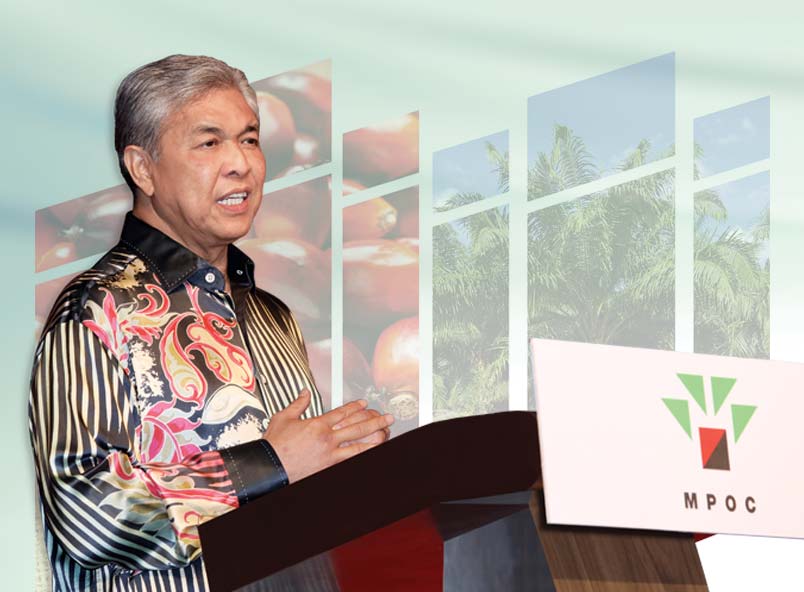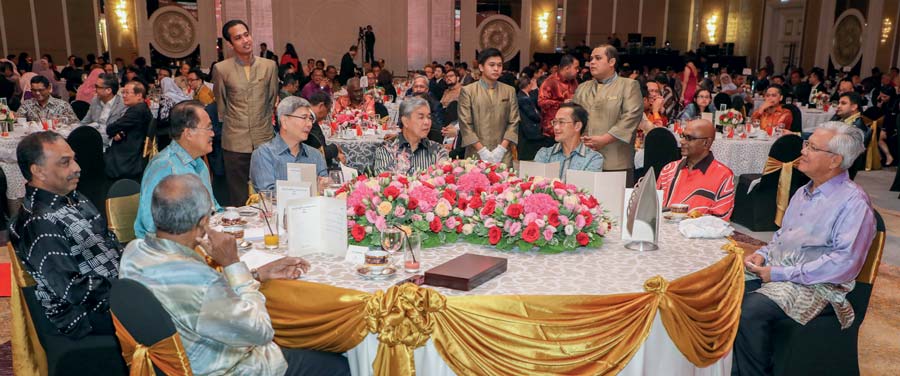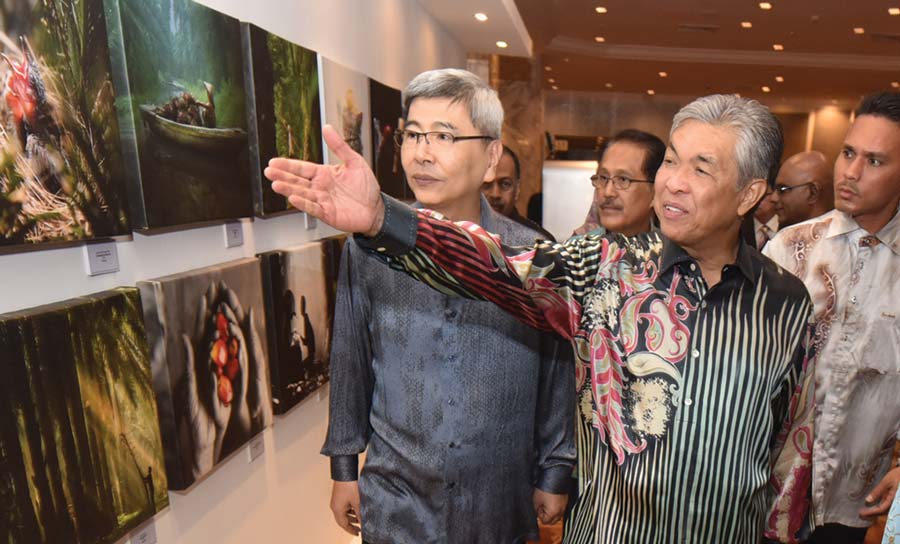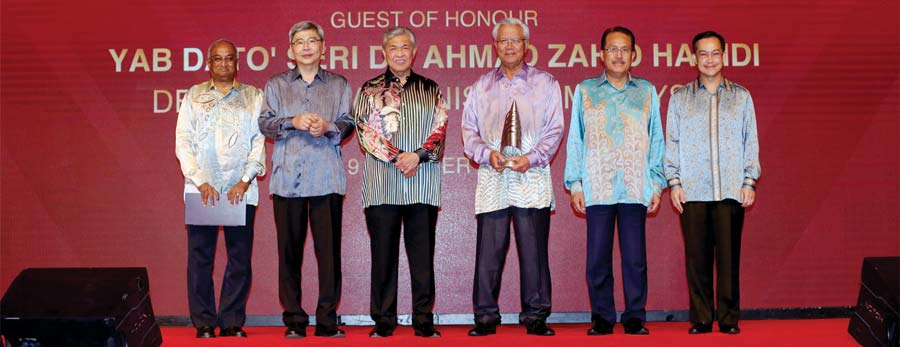



Next wave of distruption awaits
January, 2018 in Issue 4 - 2017, Cover Story
The Malaysian Palm Oil Council unveiled the recipients of its much-anticipated annual industry awards (see page 2) in Kuala Lumpur on Oct 9. Officiating at the event, Deputy Prime Minister Dato’ Seri Dr Ahmad Zahid Hamidi noted that the awards were particularly meaningful as 2017 marks the centenary of the domestic palm oil industry. To continue adding value to palm oil, he stressed the importance of embracing new technologies. An edited version of his speech follows.
“The oil palm was introduced to Malaya as an ornamental plant in the 1870s and remained so until 1917, when the first commercial planting started. It was transformed into a commodity crop that laid the foundation for Malaysia’s palm oil industry. It grew and evolved, minting Malaysia’s presence as the world’s leading producer and exporter of palm oil. The industry also played an instrumental role in poverty alleviation. In the words of [2nd Prime Minister] Tun Abdul Razak [Hussein], the oil palm sector provided ‘land for the landless and jobs for the jobless’.

Today, the industry sustains some 650,000 smallholders; and if we take the breadth of the supply chain into account, two million Malaysians rely on the industry for their livelihood. These numbers tell a story – a story of how palm oil is intertwined with Malaysia’s development in a bond that can never be broken.
When we gained Independence 60 years ago, half of the population was grappling with poverty, with the majority living in rural areas where infrastructure was wanting. There was a big gap in the living conditions of the urban and rural populations because of the imbalance in economic opportunities. The government realised that it had to address this urgently.
Policies were formulated to ensure balanced economic growth and to reduce the income gap between rural and urban Malaysians. This innovative approach started with the setting up of FELDA in 1956, with oil palm being the chosen cash crop. FELDA’s success led to other land development agencies, such as FELCRA, SALCRA and KESEDAR, all aimed at generating more employment opportunities.
The success of FELDA is the envy of the world – in just one generation, we not only reduced poverty, but created a new middle class. The United Nations and other international agencies have acknowledged that Malaysia has one of the best poverty reduction and economic restructuring programmes in the world. Today, Malaysia is a vibrant player in the global palm oil industry, producing close to 20 million tonnes and achieving a total export value of RM67 billion in 2016.
However, the industry faces unprecedented challenges, such as the ‘No Palm Oil’ campaign in several member-states of the European Union. We cannot stay silent any longer. We must respond rationally to negative campaigns, with facts and figures on issues of alleged deforestation and the destruction of wildlife habitats. The government will not tolerate negative campaigns; we will ensure on behalf of all of you here, and especially the 650,000 smallholders, that Malaysia gives a fitting response to those who harm the palm oil industry.

We must also forge ahead with sustainability certification and adopt best agricultural practices. I welcome the decision that the Malaysian Sustainable Palm Oil (MSPO) standard will be made mandatory by 2019. I strongly believe that this is the best move Malaysia can make in setting the agenda on certification; this should not be done by an external body that may not have the best interests of the industry at heart.
As the Member of Parliament for Bagan Datuk, I am well aware of these challenges because palm oil is an integral part of the local economy. Let me reiterate that the benefits of MSPO certification to both smallholders and estate owners will outweigh the costs. The government has allocated RM130 million to help smallholders obtain MSPO certification free of charge. It is encouraging that, so far, 19 sustainable palm oil clusters involving 1,040 smallholders and 4,127 ha of land have obtained certification.
The government allocated RM1.04 billion to smallholders under the 10th Malaysia Plan and RM540 million under the 11th Malaysia Plan, to undertake replanting and new planting. In addition, RM48 million was allocated to facilitate their participation in the livestock integration scheme to generate extra income.
As the next wave of technological disruption takes place in the form of Industry 4.0, we must be at the forefront of embracing new technologies to add value to the palm oil industry. For example, there is an urgent need for mechanisation, precision agriculture and automation in the upstream sector to reduce dependency on labour. Increased productivity will bring about increased returns. The government has provided funds and incentives to encourage mechanisation and automation.
The palm oil industry must also seriously consider adopting information technology, not only to ensure food chain security and tracing of the supply chain, but also toward production that is seen to be sustainable. This will silence critics.
We must harness new technologies and leverage on the experiences of the last 100 years to ensure we remain on top of the game in ensuring national and global food security. Towards this end, I would like to see the MPOB intensify its focus on commercially-driven research, so we can monetise our efforts and bring more value to the palm oil industry.

With the world population growing rapidly, there is room for natural growth of the palm oil industry. We must work hard by opening up new export markets and strengthening our position in the current markets where we have a good foothold. It is in the best interests of us all to ensure that Malaysia remains a key player in R&D and innovation, and remains committed to sustainably produced palm oil.
As we reflect on the successes and strides made over the last 100 years, we know that we have done well. However, the challenges ahead are not fully known, and the next 100 years may not be as kind. Palm oil remains the world’s most widely consumed vegetable oil and we must ensure that we do our best to remain in pole position.
The government will continue to set clear and right policies with precise goals. The industry must meet us regularly and provide its fullest cooperation. Together, we will make it work – for we owe to Malaysia and Malaysians a continued prosperity and stability.”